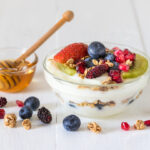“Hack” your yogurt: How one simple addition promotes gut health
 (NaturalHealth365) Some culinary combinations just make inherent sense. Enhancing one nutritious food with another – for instance, drizzling golden honey into a bowl of creamy yogurt – not only makes the snack more delicious but ramps up its beneficial probiotics.
(NaturalHealth365) Some culinary combinations just make inherent sense. Enhancing one nutritious food with another – for instance, drizzling golden honey into a bowl of creamy yogurt – not only makes the snack more delicious but ramps up its beneficial probiotics.
As it happens, even scientists and dietitians are on board with this common-sense food hack. And recent studies back them up. New laboratory and clinical research conducted at the University of Illinois College of Agricultural, Consumer, and Environmental Sciences has just confirmed the surprising health benefits of the honey-yogurt combo.
Honey helps beneficial probiotics survive in the gut
The study, published on August 5th in the Journal of Nutrition, analyzed the effects of different types of honey on Bifidobacterium animalis, a beneficial type of lactic acid bacteria found in yogurt. The researchers concluded, “Yogurt with added honey improves probiotic survivability during in vitro digestion.” In other words, adding honey to (already probiotic-rich) plain yogurt increases the probiotic levels even further as both foods are digested – making this a good technique for supporting the balance of the gut microbiome, the all-important community of bacteria in the gastrointestinal tract.
The team found that clover honey had the greatest effect, followed by alfalfa, buckwheat, and orange honey varieties. Researchers believe that honey’s impressive assortment of antioxidant flavonoids and phenolic compounds – which include caffeic acid, kaempferol, rutin, chrysin, naringenin (also found in oranges and lemons), quercetin and apigenin (also found in parsley and celery) – was responsible for the increased probiotics.
Probiotics also increased in clinical study
To confirm the intriguing results of the laboratory study, the scientists enlisted 66 healthy volunteers. They asked them to consume two different items – plain yogurt with clover honey and plain honey-free yogurt. As the scientists had expected, pairing honey with yogurt supported the survival of the yogurt’s probiotic bacteria in the gut.
The team pointed out that certain food combinations can enhance the bioavailability of their nutrients in the same way that carrots consumed with healthy fat (such as olive oil) offer better absorption of their carotenoid plant pigments than would otherwise occur. While some research has shown that enhancing the health of the gut microbiome is associated with improvements in elimination, digestion, cognition, and mood, this did not occur in this study.
The researchers observed that there were no noticeable effects on these parameters.BBHowever, they pointed out that the good health enjoyed by the volunteers didn’t leave much room for improvement.
Support a healthy microbiome with proper nutrition
Enzymes in the mouth, stomach, and intestines are necessary to promote digestion and nutrient absorption. However, these can also affect the ability of microbes to survive. Of course, this is a bonus when the target is pathogens – but it is a drawback when it comes to the gut microbiome’s population of beneficial bacteria. If the balance between “friendly” and “unfriendly” bacteria is disturbed (a condition known as dysbiosis), this can lead to health problems such as bacterial infections, inflammatory bowel disease, chronic fatigue, mood disorders, obesity – and more.
By the way, probiotics are defined as live organisms that support the survival of “friendly” bacteria and the overall balance of the gut microbiome. Fermented foods, such as yogurt, certain cheeses, fresh, refrigerated sauerkraut, and kimchi, are good sources of probiotics. Other foods that encourage a diverse and balanced microbiome include plant-based fare – such as fruits, vegetables, nuts, and seeds – along with cold-water fatty fish and eggs.
Foods potentially detrimental to the microbiome include highly processed items, fried foods, sugar, artificial sweeteners, dyes, excessive red meat, and unhealthy fats.
Why not “supercharge” your yogurt?
Incidentally, you don’t have to use a heavy hand when adding the honey. The scientists found that the effective dose was one to two tablespoons for every 170-gram yogurt serving (about six ounces). If you have diabetes, consult your holistic physician or nutritionist regarding honey consumption.
Sucrose-rich honey is a type of sugar and should be enjoyed in moderation to avoid weight gain. Add organic honey only to plain, unsweetened yogurt (unpasteurized) for maximum benefit, choosing a brand containing live, active cultures.
But why stop at adding honey? You can “supercharge” your yogurt even more by adding fresh or frozen organic strawberries, raspberries, or blueberries. Or, toss in sunflower seeds or chopped almonds to add healthy monounsaturated fat, dietary fiber, and essential minerals.
The next time you’re spooning up a bowl of yogurt, try the “honey hack” to protect and increase probiotics. Your body will thank you!
Sources for this article include:
ScienceDirect.com
ScienceDaily.com
ScienceDirect.com
ClevelandClinic.org
VerywellHealth.com



